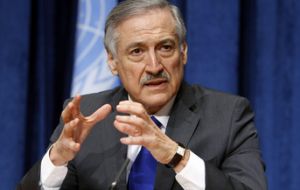MercoPress. South Atlantic News Agency
The “State is back” in Latinamerica to lessen inequalities, says top UN official
 Heraldo Muñoz head of the UNDP for the region says tax reform is essential to have sufficient funds to invest
Heraldo Muñoz head of the UNDP for the region says tax reform is essential to have sufficient funds to invest The ‘State is back’ in Latinamerica and will help establish social policies, diminish inequality and increase inclusion said the regional director of the UN Development Program, Herlado Muñoz during a seminar in Mexico City on “Youth participation and democratic governance in Latin America and the Caribbean”.
“For the first time in many decades the State is back in Latinamerica which will help with sustained social policies that transcend governments and become State policies”, said Muñoz. He added people are demanding “more government intervention to help reduce poverty, crime, improve health and education standards”, which is contrary to the nineties when according to the Washington consensus, “the problem was government”.
The slogan at the time was “minimum government, maximum market” which led to the increase in inequality, explained the UN official.
“The market was not interested in the poorest, in those with no health insurance or in government schools, and I believe this has been a mayor failure of neo-liberalism which has driven all governments, either conservative, centre or left to sponsor a more active, present and vigorous State”.
In the Eradication of Poverty day, Muñoz said that the main challenges are inequality, quality education, an increase in funds for science and technology to help add value to exports, a national health scheme, jobs and citizens’ security.
However despite the “great strides” in recent years which have helped reduce poverty with 51 million people climbing to the middle classes, according to the UNDP figures “Latinamerica remains as the most unequal region in the world”.
Of the 600 million in the region, 174 live in poverty, of which 73 in extreme poverty according to the UN Economic Commission for Latam and the Caribbean. But besides economic disparities there are also inequalities of gender, different salaries for men and women as well as ethnic and territorial difference which make them “the priority of the political agenda for Latinamerican countries”.
With that in mind it is necessary to implement “tax reforms which enable governments to obtain resources” since currently the fiscal display in most countries of the region is ‘regressive’ with taxes on consumption instead of direct taxes on property and assets, explained Muñoz.
“Fiscal pressure is relatively low for what the region needs. If we want to invest in education, health, in providing funds for research we need tax reform, combat evasion and elusion but through political consensus”.
Regarding democratic governance the UN top official said that it has significantly improved and currently the region is going through the longest period of governments with democratically elected authorities, despite the fact ‘much is still needed’.
Certainly “we have improved electoral democracy, but there are problems of quality, we can’t feel satisfied, there is frustration among the younger generations, corruption in government posts and the private sector, weak institutions in some cases and the erosion of the rule of the law in others”.
But Muñoz brushed aside the existence of a polarization in political alternatives in the region and on the contrary applauded the diversity and the existence of governments from virtually all ideological tendencies living side by side.
Finally the UN official said Latinamerican youth need to be encouraged to become political actors which demand more inclusion and rights than those they have been given so far.
“We are talking of the first generations that have not known the dictatorships of the seventies and eighties in Latam and their demands and contributions could be substantial. Likewise we must integrate them to the traditional system to enrich political dialogue”, concluded Heraldo Muñoz.




Top Comments
Disclaimer & comment rules-

-

-

Read all commentsTouché :)
Oct 17th, 2012 - 07:20 am 0and necons sad...
Oct 17th, 2012 - 07:58 am 0Latin America (especially Argentina) has well known made ...
Oct 17th, 2012 - 08:57 am 01) ..do not be paralysed by the fear of moral hazard,
2)..treat sick fundamentals ,not symptoms,
3)..cut excessive debts,
4)..encapsulate banking risks,
5)..change the bad habits after rehabilitation,
6)..beware of currency redenomination.
are these ( 6 ) enough these made matters to understand some of their improvements and technical systems.....certainly not enough.
Commenting for this story is now closed.
If you have a Facebook account, become a fan and comment on our Facebook Page!